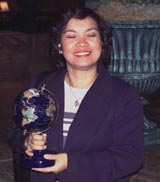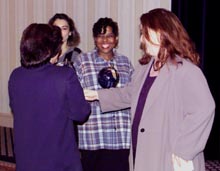| A
few images from the Morning Parallel Sessions: |
|
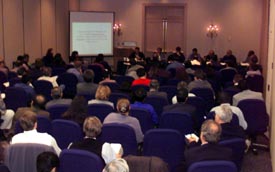 |
View
of the Jefferson III-IV room in session |
| "Forests
and the Poor: The Impact of Globalization": J.F.M. Arnold, Oxford
University, discussed linkages between forests and the poor, the ability
of poor to access the potential benefits of forest resource use, and
the relationship between the increase in the global value placed on
forests and the increasing market value of forest products. He identified
issues stemming from collective management: failure of governments to
empower locals; local institutions favoring entrepreneurial, political
and bureaucratic desires rather than the interests of the poor; heterogeneous
and fractured communities with conflicting interests; and lack of effective
conflict resolution measures. |
 |
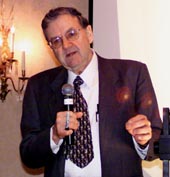 |
"Role
of Agriculture Technology in Rural Development": Robert Evenson,
Director, Economic Growth Center,Yale University, highlighted findings
of a study on crop germplasm improvement. Emphasizing impacts of modern
varietal improvements, he distinguished the processes of moving toward
the best practice technological frontier and moving the technological
frontier itself. He stressed that moving the frontier itself is difficult,
but that moving it increases the value of all activities that move towards
it. He emphasized the importance of public sector research and noted
it is the public sector not the private sector which drives up productivity |
|
Food Insecurity
and Vulnerability Information and Mapping Systems (FIVIMS): David
Marshall, FAO Statistics Division, spoke on links between food insecurity
and vulnerability included in the joint FAO, World Bank, the USDA
and participating African countries initiative aimed at strengthening
national systems of food and agricultural statistics, specifically
in Ghana, Malawi, Tanzania, Madagascar and Guinea. He claimed that
FAO's statistical databases on agriculture, forestry and fisheries
are the largest and most up-to-date in the world, and include time
series data on production, trade, agricultural inputs and land use.
He conceded that the quality of data is only as good as the data provided
by national statistical systems.
|
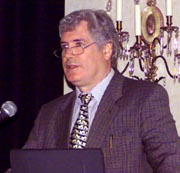 |
| Final
Plenary |
|
Six regional
focus areas met on Thursday afternoon in breakout sessions to identify
key issues and opportunities, and reported on their outcomes in
the final Plenary:
 The East Asia and Pacific group identified five key constraints
affecting rural development: off farm employment/income generation;
institutional capacity; sustainable natural resource management;
access to rural finance; and appropriate technology.
The East Asia and Pacific group identified five key constraints
affecting rural development: off farm employment/income generation;
institutional capacity; sustainable natural resource management;
access to rural finance; and appropriate technology.
 The Europe and Central Asia group identified actions for poverty
reduction, including: create private and transparent land ownership
and land markets; facilitate emergence of transparent markets for
production inputs and outputs; promote export; create private, sustainable
financial systems through development of appropriate policy, legal
and institutional frameworks; and increase attention to natural
resource management.
The Europe and Central Asia group identified actions for poverty
reduction, including: create private and transparent land ownership
and land markets; facilitate emergence of transparent markets for
production inputs and outputs; promote export; create private, sustainable
financial systems through development of appropriate policy, legal
and institutional frameworks; and increase attention to natural
resource management.
 The African region group presented results from its breakout
groups on community participation, rural infrastructure, technology,
governance, education, HIV/AIDs, markets and agro-enterprises
and natural resources.
The African region group presented results from its breakout
groups on community participation, rural infrastructure, technology,
governance, education, HIV/AIDs, markets and agro-enterprises
and natural resources.
 The South Asian region group noted the need for action on:
rationalisation of public and private sector roles; increased
investment in rural infrastructure; increased involvement in poverty
targeted and community driven programmes that are inclusive and
address vulnerable groups; enhancement of agricultural activity
though technology; participatory approaches; development of partnerships;
and improved portfolio management.
The South Asian region group noted the need for action on:
rationalisation of public and private sector roles; increased
investment in rural infrastructure; increased involvement in poverty
targeted and community driven programmes that are inclusive and
address vulnerable groups; enhancement of agricultural activity
though technology; participatory approaches; development of partnerships;
and improved portfolio management.
 Middle East and North Africa group said water scarcity represents
the region's predominant constraint, but highlighted progress
in water strategies, policy changes and pricing, integrated and
participatory approaches to water resources, and improved country
and donor coordination.
Middle East and North Africa group said water scarcity represents
the region's predominant constraint, but highlighted progress
in water strategies, policy changes and pricing, integrated and
participatory approaches to water resources, and improved country
and donor coordination.
 Latin America and the Caribbean region participants agreed
that they do the following activities well: demand driven rural
investment funds, market assisted land reform in Brazil and land
titling or administration projects. On what they felt the regional
staff "does well but is not recognized for," the group identified
agricultural technology transfer to small farmers.
Latin America and the Caribbean region participants agreed
that they do the following activities well: demand driven rural
investment funds, market assisted land reform in Brazil and land
titling or administration projects. On what they felt the regional
staff "does well but is not recognized for," the group identified
agricultural technology transfer to small farmers.
 The "multi-regional, multidimensional group" discussed issues
including: the ownership of vision to action strategy documents
by regions; dialogues with countries on vision to action updates;
capacity building on trade issues; the lack of practical orientations
in policy directives; the need for balancing between Bank sector
and project work.
The "multi-regional, multidimensional group" discussed issues
including: the ownership of vision to action strategy documents
by regions; dialogues with countries on vision to action updates;
capacity building on trade issues; the lack of practical orientations
in policy directives; the need for balancing between Bank sector
and project work.
|
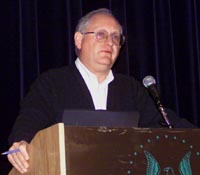 |
 Commenting
on the regional presentations,
Robert Thompson identified a number of common themes.
Commenting
on the regional presentations,
Robert Thompson identified a number of common themes.
 Thompson remarked that the focus of rural development
has broadened to a more integrative approach encompassing more then
just agriculture as the vehicle for poverty reduction. He underscored
the need to find ways to break down walls between sectors at the World
Bank as well as between relevant governmental institutions. He drew
attention to the theme of decentralization, community action and a
participatory approach that emerged at Rural Week 2000 and suggested
this could form the foundation for a new rural development strategy.
Thompson remarked that the focus of rural development
has broadened to a more integrative approach encompassing more then
just agriculture as the vehicle for poverty reduction. He underscored
the need to find ways to break down walls between sectors at the World
Bank as well as between relevant governmental institutions. He drew
attention to the theme of decentralization, community action and a
participatory approach that emerged at Rural Week 2000 and suggested
this could form the foundation for a new rural development strategy.
|
|
|
| Interview
with Bob Thompson |
|
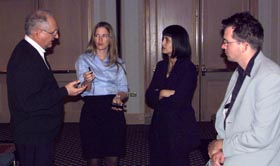
Minutes after
the close of Rural Week 2000, the SD team spoke with Mr Thompson on...
 ... the theme of and intent behind Rural Week and the follow-up
process to the review of "Vision ot Action" undertaken at
the meeting.
... the theme of and intent behind Rural Week and the follow-up
process to the review of "Vision ot Action" undertaken at
the meeting.
 ... shifts in the Bank's and government's role in sectoral approaches,
and the thorny question of corruption
... shifts in the Bank's and government's role in sectoral approaches,
and the thorny question of corruption
From
left to right: Bob Thompson, RDV; Laura Ivers; Nabiha Megateli and
Richard Campbell. Behind the camera: Andrei Henry.
|









